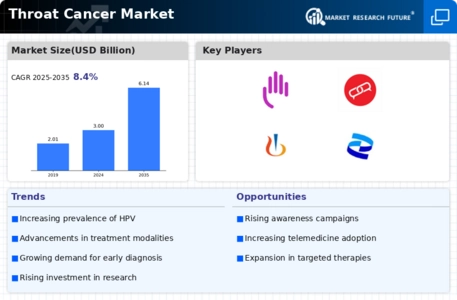Market Analysis
In-depth Analysis of Throat Cancer Market Industry Landscape
Market dynamics for throat cancer treatment are heavily influenced by prevalence and risk factors. Smoking, alcohol abuse, and HPV infection are commonly linked to throat cancer, which also encompasses larynx and pharyngeal cancers. Global incidence rates impact the quest for feasible treatment choices. Cutting-edge diagnostic technologies greatly impact industrial dynamics. Early detection of throat cancer improves treatment outcomes. Imaging, endoscopy, and genetic diagnostics help stage malignancies and identify tumor characteristics, which affects treatment decisions. Mouth and throat cancer therapy choices drive market dynamics. Surgery, radiation, chemotherapy, and targeted therapies are used. Before selecting a therapy, medical stage, tumor location, and patient health are evaluated. Therapy has improved, making treatment more personalized and efficient. In recent years, immunotherapy has showed promise for throat cancer. Some immune checkpoint inhibitors function, including pembrolizumab and nivolumab. These inhibitors supplement traditional therapy. Boosting the immune system is changing throat cancer therapy. The emergence of biosimilars changes the market, notably for targeted therapies and throat cancer biologics. Biosimilar competition and pricing tactics may make these advanced medications more affordable and accessible. Collaborations between global research institutions, pharmaceutical companies, and healthcare organizations are improving throat cancer therapy. Collaboration speeds pharmaceutical development, conducts clinical research, and shares information to foster innovation and impact market dynamics. Regulatory certifications and approvals considerably affect market dynamics. The speed at which breakthrough therapies are reviewed and innovative treatments are regulated affects the introduction of new drugs. This affects competitiveness and patient access. Trends toward patient-centered care affect throat cancer treatment dynamics. Supportive care, side effect control, and patient quality of life all affect treatment decisions and pharmaceutical company product differentiation. Healthcare payment regulations affect throat cancer therapy. Innovative medications, diagnostic tests, and supportive care measures are costly, therefore payment restrictions must be navigated to ensure patients get complete and affordable treatment. Screening and early detection programs affect market dynamics. Public health efforts may affect diagnostic timeliness and treatment outcomes. Awareness campaigns and high-risk screening programs are among these measures. Patient advocacy groups and awareness campaigns affect treatment accessibility, governmental decisions, and research funding, which affects market dynamics. These groups educate patients, advocate for improved treatments, and provide a supportive environment for throat cancer sufferers. Healthcare spending is one of several economic factors that affect market dynamics. The cost and availability of throat cancer treatments vary by area. To make their goods available worldwide, pharmaceutical companies must change their pricing tactics.







Leave a Comment